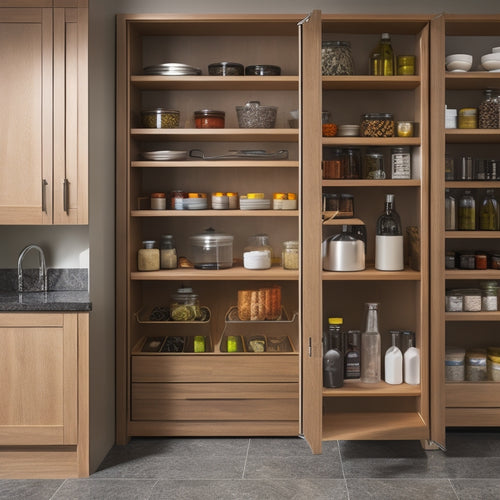
Revamp Your Home: Master Essential Housekeeping Habits
Share
Mastering vital housekeeping habits is a pivotal step in transforming your living space into a tidy, organized, and peaceful oasis. By prioritizing small, manageable changes, you can form habits that lead to efficiency and reduced stress. Adopting vital habits such as maintaining a tidy living space, preventing clutter accumulation, and establishing a nightly tidying routine can help you achieve this goal. By building one vital habit in 30 days, you can kick-start your journey towards a consistently tidy home. As you progress, you'll discover the benefits of healthy habits and be inspired to take action, seamlessly integrating habits into your daily routine to achieve a harmonious living space.
Key Takeaways
• Adopting essential housekeeping habits leads to a tidy living space, reduced stress, and increased efficiency in daily life.
• Start with small, manageable changes to prioritize habit formation and sustainability.
• Establishing a nightly tidying routine and designating clutter-free zones helps maintain a consistently tidy home.
• Track progress and celebrate successes to reinforce new habits and promote long-term adoption.
• Integrating habits into existing routines ensures they become second nature and a part of your daily life.
The Power of Habit Formation
Forming habits is an vital step in maintaining a tidy and organized living space, as it enables individuals to incorporate necessary housekeeping practices into their daily routines, ultimately leading to a more efficient and stress-free environment.
To effectively form habits, it is essential to employ habit formation strategies that prioritize small, manageable changes. This approach allows individuals to build upon their existing routines, making it more likely that new habits will stick.
Essential Housekeeping Habits to Adopt
By incorporating simple yet effective habits into daily routines, individuals can maintain a tidy and organized living space with minimal effort, ultimately leading to a more efficient and stress-free environment.
Adopting essential housekeeping habits, such as cleaning as you go and establishing a nightly tidying routine, helps prevent clutter accumulation and sets a positive tone for the day.
Designating clutter-free zones also maintains organization and reduces stress.
By linking housekeeping habits to existing daily routines, individuals can create a sustainable and systematic approach to maintaining a tidy home.
Your 30-Day Habit Building Challenge
To kick-start your journey towards a consistently tidy home, commit to dedicating the next 30 days to building one essential housekeeping habit that will set the foundation for a more organized and stress-free living space. This challenge will help you establish a routine, track progress, and celebrate successes.
| Habit | Daily Reminders | Habit Tracking |
|---|---|---|
| Make Bed | Set alarm 10 min earlier | Daily |
| Clean as You Go | Place sticky notes in kitchen | Weekly |
| Nightly Tidy | Set reminder on phone | Daily |
| Designate Clutter-Free Zone | Post-it on fridge | Bi-Weekly |
| Link Habits to Routines | Review daily schedule | Monthly |
The Benefits of Healthy Habits
Establishing healthy housekeeping habits yields a multitude of benefits that extend beyond a tidy living space, positively impacting daily life and overall well-being.
By adopting consistent habits, individuals can experience a significant efficiency increase, as tasks become less time-consuming and more manageable.
Additionally, a clutter-free environment contributes to a reduction in stress levels, leading to improved mental well-being.
A tidy home also promotes a sense of control and calmness, allowing individuals to focus on more important aspects of their lives.
Moreover, healthy habits lead to a consistent and organized living space, providing a sense of security and comfort.
Taking Action Towards a Tidy Home
Now that the benefits of healthy housekeeping habits are clear, it's time to turn intentions into actions, focusing on the practical steps needed to integrate these habits into daily life.
To achieve a tidy home, integrating daily routines and tidying strategies that become second nature is crucial.
Here are four vital action steps to get you started:
-
Schedule daily tidying sessions: Allocate a specific time each day to tidy up and maintain organization.
-
Create a morning routine: Begin your day by making your bed and setting a positive tone for the rest of the day.
-
Link habits to existing routines: Integrate housekeeping habits into your daily activities, such as cleaning as you go while cooking.
- Track progress and adjust: Monitor your progress, identify areas for improvement, and adjust your strategies accordingly.
Frequently Asked Questions
How Do I Handle Cluttered Areas That Are Not My Responsibility?
When faced with cluttered areas not under your control, establish responsibility boundaries by communicating concerns with shared space occupants, seeking compromise on maintenance duties to guarantee a harmonious and organized living environment.
Can I Still Have a Clutter-Free Home With Kids and Pets?
Yes, achieving a clutter-free home with kids and pets is possible by implementing toy organization systems, regular pet grooming, and maintaining a daily decluttering routine alongside a scheduled cleaning schedule to guarantee a safe and harmonious living environment.
What if I'm Not a Morning Person and Can't Make My Bed?
As the morning sun rises, it's okay to sleep in; instead, weave a nighttime routine that sets the tone for a peaceful tomorrow, incorporating meditative cleaning and organization that respects your personal boundaries, without the pressure of being a morning person.
How Do I Maintain Habits When Living With a Clutter-Prone Partner?
When living with a clutter-prone partner, maintain habits through open communication, setting clear boundaries, and finding compromise. Foster teamwork by delegating tasks and establishing mutual respect, ensuring a harmonious and organized living environment.
Are There Any Habits That Can Help With Seasonal or Holiday Clutter?
Did you know that the average American spends 4.5 hours per week searching for lost items? To combat seasonal clutter, designate a specific area for storing seasonal decorations, and implement a "one in, one out" policy when acquiring new items.
Related Posts
-

Stackable Kitchen Containers for Modular Systems
Stackable kitchen containers for modular systems change your cooking space by maximizing vertical storage and enhanci...
-

Space-Saving Lazy Susan Cabinet Solutions
Space-saving Lazy Susan cabinet solutions can change those awkward corner spaces into organized storage wonders. You'...
-

Ceiling-Mounted Pot Racks for Professional Chefs
Ceiling-mounted pot racks are revolutionary for professional chefs like you. They make use of vertical space, keeping...


